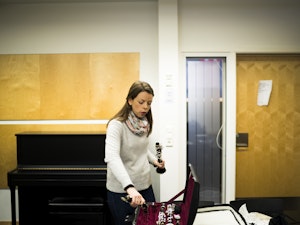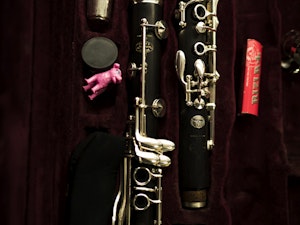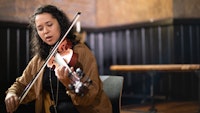The ensemble musician Ingeborg E. Moe wanted to break with tradition and work across genres in her Master’s degree project. She wanted to forge her own path.
The music she has been devoting her time to gives a good indication of her broad interests: early music, mostly Baroque, and a little Viennese classicism. Contemporary music at the other end, with pivotal works and newly written ensemble music in a project with Masters’ students at the Norwegian Academy of Music. And, finally, a jazz-inspired repertoire. All of this was carried out with concerts featuring a big band and orchestra, and finally an examination concert with the Royal Norwegian Navy Band.
“I wanted to challenge myself, in terms of both genres and roles, because I hadn’t envisaged being a soloist with a big band and a professional orchestra until I started the project.”
Moe has worked on three different parts of the clarinet repertoire because she wanted to do something she had not done previously.
“I didn’t just want to get stuck in the classical and romantic repertoire – what is considered central to the clarinet. I wanted to delve more deeply, as you have to do that in a Master’s course.”
She already had years of experience as a musician under her belt, with a versatile and varied working day in different ensembles, but she wanted more experience and, as an ambitious musician, was aware of the need for more knowledge in various situations.
“Questions kept popping up. I should have mastered this much better. I should have focused on this even more. The written music often says little. How am I going to emphasise this?”
Challenged
It was challenging for Moe to arrive at the topic of her project. A world of possibilities opened up, with music which was not easy to perform after she had completed her studies at the Academy.
“Many people in the Master’s programme, as in the Bachelor’s, base their choice on the repertoire. You try to find a golden thread.”
But Moe wanted to make use of her experience from working life, including the Norwegian Radio Orchestra, the National Opera Orchestra, the Arctic Philharmonic and the Armed Services’ Music Division, including the Staff Band of the Norwegian Armed Forces – where she currently holds a temporary position. In addition, Moe auditioned for the Norwegian Wind Ensemble in Halden, played with them for three trial weeks, and gained inspiration.
“They are largely committed to a clear profile featuring early music and real-time music – improvisation with a classical starting point. I was keen to do as good a job as possible during my trial weeks, but if the Master’s programme had not been designed as open-endedly as it is now, I would have based myself more on the clarinet repertoire and large-scale works you have to get to grips with. It wouldn’t have been as creative. With the aid of a mentor and fellow students, I managed to get to the heart of the project. What is important for me as a musician? That’s a question people don’t usually ask themselves. You do what you think you have to do in your work as a musician. This project challenged me; I had to relate to diverse feedback from different teachers, and I had to interpret my way to what was right for me.”
In addition to lessons with clarinet teachers Leif Arne Pedersen and Björn Nyman, Moe also studied with Baroque violinist Bjarte Eike, who works on crossover projects, among other things, and with the jazz saxophonist Morten Halle.
Risky project
Plenty could have gone wrong, and Moe doesn’t hesitate to call it a risky project. But she accomplished it.
“Before the first rehearsal with the orchestra and the big band, in particular, I didn’t know whether I was barking up the wrong tree altogether. I asked myself a lot of critical questions, but didn’t let things get the better of me. As a musician, you’re very much on your own, practising alone in your room, and I wondered what it would be like to stand out there in front when we had to put the whole thing together. Had I cracked the style code, and would it work in the context? Then the jazz musicians came and it was all cool; then I could relax.”
Moe comes from a home full of music and singing in Bergen. She was an obvious candidate for Skjold School’s marching band, and both siblings played in a band. She took part in national competitions on both piano and clarinet. During her year at Toneheim Folk University College she resolved to make a professional commitment to the clarinet. Freelancing followed. At the Academy of Music she first studied music education before switching to performance at a later stage.
The Master’s project, which has now been completed, became Moe’s formative journey.
“I thought I wasn’t a soloist. I thought I was an ensemble musician, and I was comfortable with that. I even managed to stand on stage and juggle between roles, performing in widely divergent genres from various musical eras. I hardly dared hope I could manage to relax on stage and have fun. One of the things I was going for and believe I have achieved is a greater register of expression, and more timbres. I feel more confident about expressing what I want. I’ve grown closer to myself, though I may not have reached my goal yet.”
Do you feel you have a sort of head-start with your experience?
“Yes, that may be. You tend to have external goals once you’ve got into the Academy of Music— securing a particular job, for instance. I almost got a job – short-listed in second place – with the Norwegian Wind Ensemble. That’s partly how this project came about. You also have to turn that external goal into an internal one. Interest, drive and motivation – stay enthusiastic! I put in long days. When you’re dealing with something you enjoy and have created the project yourself, there’s a different kind of energy. Nowadays I think I have a clearer idea about what interests me as a musician, have more self-confidence and dare to take more independent musical choices than before.”
Were you afraid of sacrificing depth by spreading your net so wide?
“That’s a good question. I feel I’ve immersed myself thoroughly in each style and presented something I can believe in and take pride in with each of these areas. In particular, I have gained incredible insight into various genres, been inspired and discovered music I want to continue to work on. Life as a musician is long, after all.”


